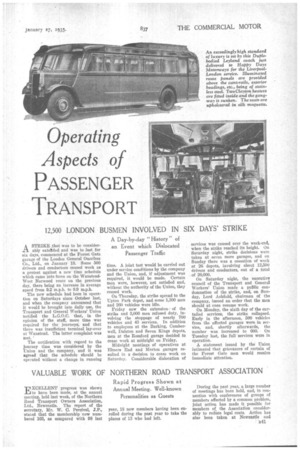Operating Aspects of PASSENGER TRANSPORT
Page 55

If you've noticed an error in this article please click here to report it so we can fix it.
12,500 LONDON BUSMEN INVOLVED IN SIX DAYS' STRIKE
A Day-by-day "History" of an Event which Dislocated Passenger Traffic IIA STRIKE ,that was to be considerably exteided and was to last for six days, commenced at the Forest Gate garage of the London General Omnibus Co., Ltd., on January 18. Some 500 drivers and conductors ceased work as a protest against a new time schedule which came into force on the WansteadWest Norwood route on the previous day, there being an increase in average speed from 9.2 m.p.h. to 9.9 m.p.h.
The new schedule had been in operation on Saturdays since October last, and when the company announced that it would be brought into daily use, the Transport and General Workers' Union notified the L.G.O.C. that, in the opinion of the staff, more time was required for the journeys, and that there was insufficient terminal lay-over at Wanstead. The latter complaint was met, • The notification with regard to the journey time was considered by the Union and the company, and it was agreed that the schedule should be oPerated without a change in running
time. A joint test would be carried out under service conditions by the company and the Union, and, if adjustment was required, it would be made. Certain men were, however, not satisfied and, without the authority of the Union, they ceased work.
On Thursday, the strike spread to the Upton Park depot, and some 1,300 men and 260 vehicles were idle.
Friday saw the extension -. of the strike and 3,000 men refused duty, involving the stoppage of nearly 700 vehicles and 43 services. In addition to employees at the Barking, Camberwell, Dalston and Seven Kings depots, men at the Romford garage decided to cease work at midnight on Friday.
Midnight meetings of operatives at Elmers End and Merton garages resulted in a decision to cease work on Saturday. Considerable dislocation of
services was caused over the week-end, when the strike reached its height. On Saturday night, strike decisions were taken at seven more garages, and on Sunday there was a cessation of work at 26 depots, involving about 12,500 drivers and conductors, out of a total of 20,000.
On Saturday night, the executive council of the Transport and General Workers' Union made a public condemnation of the strike, and, on Sunday, Lord Ashfield, chairman of the company, issued an order that the men should at once resume work.
On Monday, the sixth day of the curtailed services, the strike collapsed. Early in the afternoon, 500 vehicles from the affected garages were in service, and, shortly afterwards, the number was increased to 600. On Tuesday last, the full services were in operation.
A statement issued by the Union intimated that grievances of certain of the Forest Gate men would receive immediate attention.




























































































